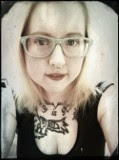 |
| Poet Ron Rash |
Poems {New And
Selected}
by Ron Rash
Ecco
An Imprint of Harper Collins
New York, NY
Copyright © 2016 by
Ron Rash
171 pages, hardcover,
$24.99
Review by Zvi A. Sesling
An argument often
persists as to where the best poets live: East Coast, West Coast, or
Midwest. Forget the rest of the world. Ah, but we forgot the south.
Fortunately Ecco, a Harper Collins imprint did not, and so we have a
fine collection from Ron Rash.
It is down south that
one finds in Deep Water
“The night smooths out its black tarp,/tacks it to the sky with
stars.” Or reading the poem In Dismal
Gorge we learn
“The lost can stay
lost down here,/in laurel slicks, false-pathed caves. Too much too
soon disappears.” While in Black-Eyed
Susans “The hay was belt-buckle
high/when rain lets up, three days’ sun/baked stalks dry, and by
midday/all but the far pasture mowed…”
Reading Rash we come to
learn many things about his environment and Southern myths. In
Whippoorwill
when a man dies, “neighbors at his bedside heard/a dirge rising
from high limbs/in the nearby woods, and thought/come dawn the
whippoorwill’s song would end…”
In Shelton
Laurel is it a Hatfield-McCoy feud, the
Civil War or just a battle among the folks in a town? Rash tells a
tale that has no answers except mystery of the course of life.
Reading Rash can be
frightening – death, sometimes violence – visits often. He also
hop scotches time; one poem takes place in the 1967, while another
takes place in 1974, another in 1959 and a couple in the 1990s. In
many others the time period is not identified and the timelessness of
these poems give them a sense of mystery. The reader wants to know
where and when. These questions remain unanswered.
The Vanquished is
a spot-on memorial to who came before the white man:
Even two centuries gone
their absence lingered—black
hair
dazzling down a woman’s
back
like rain, man’s high
cheekbones,
a few last names, no field
plowed
without bringing to surface
pottery and arrowheads,
bone-shards that spilled
across rows
like kindling, a
once-presence
keep as the light of dead
stars.
In The
Day the Gates Closed Rash writes a
nostalgic paean to simple life lost:
We lose so much in this
life.
Shouldn’t some
things stay, she said,
but it was already gone,
no human sound, the poplars
and oaks cut down so even
the wind had nothing to rub
a whisper from, just
silence
rising over a valley
deep and wide as a glacier.
Whether describing his
view of history, his personal experience, a true tale or a Southern
myth, Rash’s poems are accessible, enjoyable and worthy of being
recognized and appreciated beyond his regional fame.
__________________________________________
Zvi A. Sesling
Reviewer for Boston
Small Press and Poetry Scene
Author, Fire
Tongue (Cervena Barva Press, 2016)
Author,
Across Stones of Bad Dreams (Cervena Barva
Press, 2011)
Author, King
of the Jungle (Ibbetson Press, 2010)
Publisher, Muddy River Books
Editor, Muddy
River Poetry Review

















































